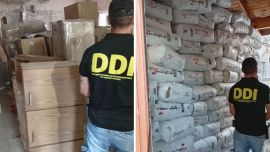The Washington-based Advanced Leadership Foundation will be leading a trade mission to the provinces of La Rioja and San Juan from March 20-28. Leading the group is former US congresswoman Loretta Sanchez and Millie Herrera, an experienced CEO and business leader and former public servant.
Born in Havana, Cuba, Herrera’s family fled the Fidel Castro regime when she was a child and moved to Baton Rouge, Louisiana. She has lived in Miami since 1987. Herrera was appointed to the US Department of Labor as the southeast regional representative under the Barack Obama administration in 2012, and she leads The Miami Group & Associates, a business consulting group that works to help companies reach their maximum potential.
The Foundation’s goal, according to Herrera, is “to form the next leaders in the world,” and the weeklong trade mission beginning next week is focusing on a small, committed group of US investors, intending to show them, first-hand, the natural resources, industries and products that the provinces La Rioja and San Juan have to offer.
“I think that there’s a marriage there that we’re failing to see, that you can be good for workers, you can be good for a country and its social needs, and you can also be a good, profitable business person,” said Herrera. “I don’t think that the two are exclusive from each other.”
The eight-day mission will welcome figures such as the director of the Argentine-American Chamber of Commerce of Florida and investors from US organisations such as the American Sustainable Business Council, Chezem Farms, and the Venture Oaks Real Estate Group, among others.
The ALF’s Green Economy Summit has taken place in Córdoba for the past two years. Why did you choose Argentina again, and specifically La Rioja and San Juan? What is it that they have to offer?
When we did the Green Summit, that opened up Argentina for us. That’s where La Rioja and San Juan came [in] and were very impressed with the work that we had done with the summit, so they said ‘Oh my goodness, we have renewable energies and we have all of these resources in our provinces and we would like to talk with you about maybe doing this kind of work over there.’
How many investors and companies will be participating in the mission?
Right now we have approximately 52 companies, and I say approximately because we probably have more that we have signed up in the last two or three days here in Argentina, in La Rioja and San Juan. And we have 20 investors from the United States. The interest has been in all the resources. A lot of them have been looking at ways to expand their businesses. And the focus that we gave is that we’re focusing on national and regional industry, trade, organisations, and also chambers of commerce.
Can you share who some of the investors that will be coming into the country are?
One of them is the National Association of Women Business Owners. That organisation has over 6,000 company members, all over the US. One of our participants comes from there, she’s an attorney, the managing partner of a large legal firm, and they represent construction and infrastructure companies, hotel chains in New York, and technology companies.
We have another firm that’s called the Winchester Advisors and they have an investment fund for technology companies. And they’re very interested because they saw that in San Juan, and even to a certain extent [in] La Rioja, they’re starting to do a lot of technology services, and they have the universities that have the workforce with those skills. If you have investment, I always look at what’s the end result: it’s not just to invest, but with economic development what you do is now you create a magnet for people who want to go to school and go into technology, now they have a place to go work, so they don’t have to leave La Rioja or San Juan, they don’t have to leave Argentina. They can stay and still have a good career and start a business, a nice start-up.
What do both the US and Argentina stand to gain from the trade mission?
The companies in the United States can expand abroad, and the companies here get an infusion of capital and investment and they can grow, and they can create more jobs and they can create better infrastructure and it just bubbles up. It’s a magnet. If you build it, they will come. One example that I was given in San Juan is that they have these tomato growers. Well, Argentina imports I think close to 40 percent of their tomato paste and tomato sauce, they import it. Having these great, wonderful natural resources… Why? Because they don’t have the capital to create production plants. So we’re going out there, we’re saying ‘Hey listen, you want to expand, so here’s an opportunity to expand.” You invest here, you create a production plant, you do a joint venture and then they produce it and then it’s also not only for internal consumption, now you no longer have to import it, but also if you have a surplus you can start exporting soon. First meet the needs of the country, that way you consume what you produce, and it helps everybody.
In light of a US foreign policy that grows increasingly protectionist, what role does a trade mission like this play?
Working with the Advanced Leadership Foundation, which is a non-profit, non-partisan organisation, I think that the fact that we’re doing that and the fact that we actually have the support of the US Department of Commerce and the US Embassy, it tells us that one thing is what the political side of the world says. The reality is that the work that we have to do has to deal with economic development, regardless of who’s in power, regardless of who is saying what. The human factor of ‘I want to succeed in life,’ that’s what really matters to us. So I think that governments are in power for a period of time and the world keeps moving.






















Comments